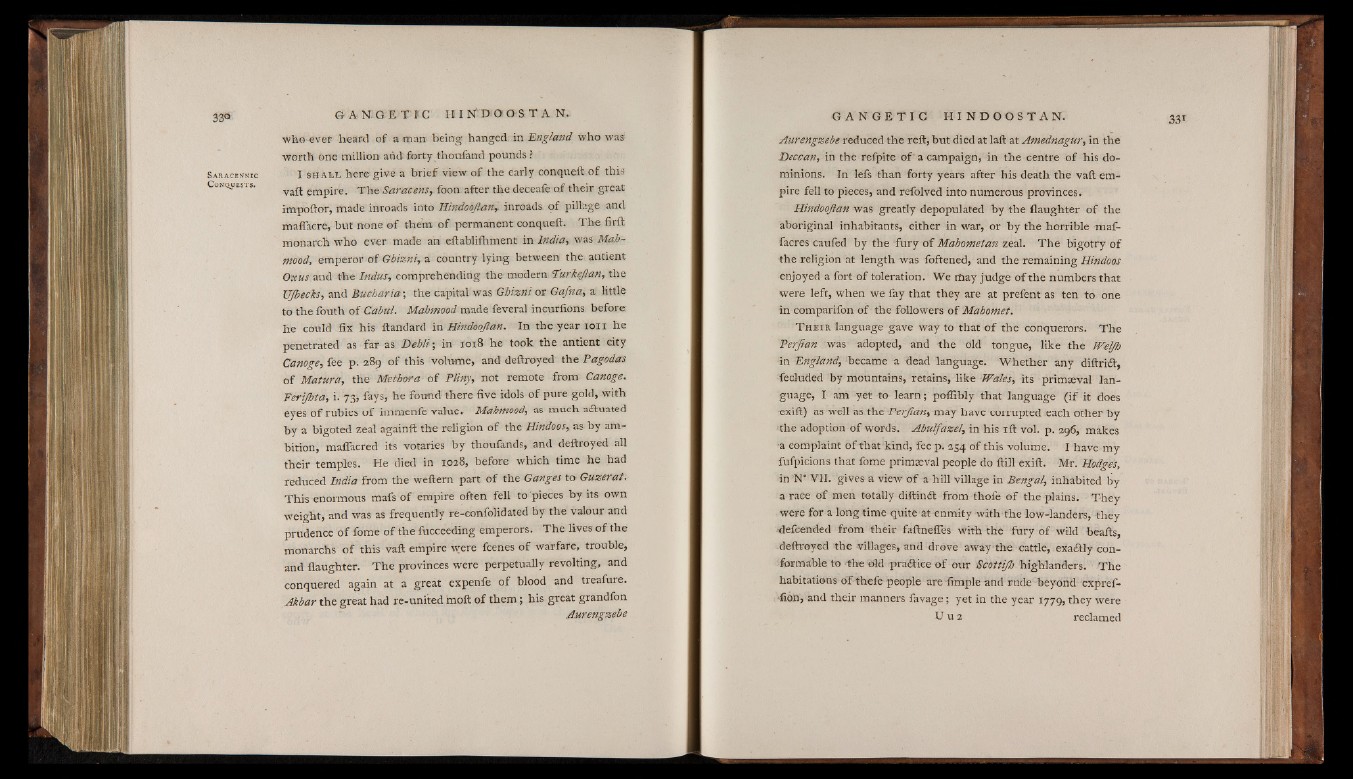
S aracennic
C onquests»
who evet heard of a man being hanged in ’Eingland who was
worth one million and forty thoufand pounds?
I s h a l l here give a brief view of the early conqueft of this
vaft empire. TYizSaracens, foon after the deceafe of their great
impoftor, made inroads into Hindoojian,. inroads of pillage and
maflaere, but none of them of permanent conqueft. The firft
monarch who ever made an eftablifhment in India, was Mab-
mood, emperor of Gbizni, a country lying between the antient
Oxus and the Indus', comprehending the modern ‘Turkejlan, the
UJbecks, and Bucbaria-, the capital was Gbizni or Gafna, a little
to the fouth of Cabul. Mahmood made feveral incurfions before:
he could fix his ftandard in Hindoojian. In the year io i i he
penetrated as far as Debli; in 1018 he took the antient city
Canoge, fee p. 289 of this volume, and deftroyed the Pagodas
of Matura, the Metho-ra of Pliny, not remote from Canoge.
Ferijhta, i. 73, fays, he found there five idols of pure gold, with
eyes o f rubies of immenie value. Mahmood, as much actuated
by a bigoted zeal againft the religion of the Hindoos, as by ambition,
maflacred its votaries by thoufands, and deftroyed all
their temples. He died in 1028, before which time he had
reduced India from the weftern part of the Ganges to Guzerat.
This enormous mafs of empire often fell to pieces by its own
weight, and was as frequently re-confolidated by the valour and
prudence o f fome of the fucceeding emperors. The lives of the
morrarchs o f this vaft empire were fcenes o f warfare, trouble,
and ilaughter. The provinces were perpetually revolting, and
conquered again at a great expenfe of blood and treafure.
Akbar the great had re-united moft of them; his great grandfon
Aurengzebe
Aurengzebe reduced the reft, but died at laft at Amednagur, in the
Deccan, in the refpite of' a campaign, in the centre of his dominions.
In lefs than forty years after his death the vaft empire
fell to pieces, and refolved into numerous provinces.
Hindoojian was greatly depopulated by the ilaughter of the
aboriginal inhabitants, either in war, or by the horrible maf-
facres caufed by the fury o f Mahometan zeal. The bigotry of
the religion at length was foftened, and the remaining Hindoos
enjoyed a fort of toleration. We may judge o f the numbers that
were left, when we fay that they are at prefent as ten to one
in comparifon of the followers o f Mahomet.
T h e i r language gave way to that o f the conquerors. The
Perjian was adopted, and the old tongue, like the Weljh
in England, became a dead language. Whether any diftriil,
fecluded by mountains, retains, like Wales, its primseval language,
I am yet to learn ; poflibly that language (if it does
exifi) as well as the Perjian, may have corrupted each other by
the adoption of words. Abulfazel, in his ift vol. p. 296, makes
a complaint of that kind, Fee p. 254 of this volume. I have my
fufpicions that fome primseval people do ftill exift. Mr. Hodges,
in N° VII. gives a view o f a hill village in Bengal, inhabited by
a race of men totally diftinét from thofe o f the plains. They
were for a long time quite at enmity with the low-landers, they
•defcended from their faftneffes with the fury of wild beafts,
deftroyed the villages, and drove away the cattle, exa&ly conformable
to the old praaiee o f our BcottiJIj highlanders. The
habitations of thefe people are dimple and rude beyond expref-
■fion, and their manners favage ; yet in the year 1779, they were
U u 2 • reclamed
i s
II
I •
" I s I
it m
¡ill